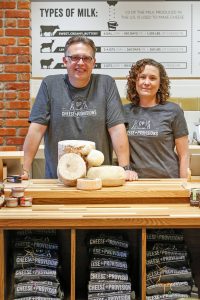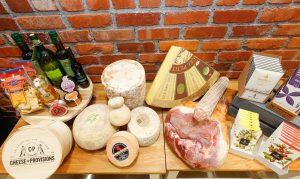By Lorrie Baumann
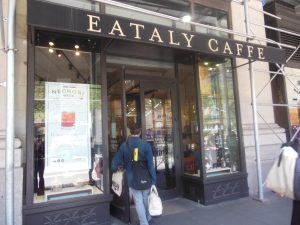 Half the sales for the Eataly store on Fifth Avenue in New York City come from dry grocery, while the other half are rung up at the store’s five restaurants. “We didn’t know that in the beginning,” Lidia Bastianich told an audience at the 2016 Dairy-Deli-Bake Seminar & Expo in May. “People really like this combination.”
Half the sales for the Eataly store on Fifth Avenue in New York City come from dry grocery, while the other half are rung up at the store’s five restaurants. “We didn’t know that in the beginning,” Lidia Bastianich told an audience at the 2016 Dairy-Deli-Bake Seminar & Expo in May. “People really like this combination.”
Eataly is owned by a partnership of Founder Oscar Farinetti, who started the concept in 2007 with a 30,000-square-foot store in Torino, Italy; the B & B Hospitality Group, which includes Lidia Bastianich, Mario Batali and Joe Bastianich; and Adam and Alex Saper. Since then, the group has grown to include a store in Chicago, a second store under development in New York’s World Trade Center and planned stores in Boston, Los Angeles and Sao Paulo Brazil.
Lidia Bastianich is the host of PBS’ “Lidia’s Kitchen” television program and the author of 10 cookbooks as well as the owner of a specialty line of pastas and sauces. She opened her first restaurant in 1971 and moved into writing cookbooks from there. Julia Child discovered her and mentored her through the development of her television program. “One thing leads to the next,” she said.
The opportunity to be part of the grocery business came along with a meeting with Oscar Farinetti, who had opened his store in Torino and was eager to find the right partners to open a store in the United States. He found New York restaurateurs B & B Hospitality Group and the Saper brothers, and together, they opened the 50,000-square-foot Eataly store on New York’s Fifth Avenue in 2010. “We found the space, we liked the location,” Bastianich said. The store now gets 50,000 visitors a day, making it one of New York City’s major tourist attractions. “You have a glass of wine, and you travel around and shop,” Bastianich said. “How civilized is that?… It’s relaxed buying.”
The store is built around La Piazza, a hub and meeting place “where people can claim their space,” Bastianich said. Around La Piazza are salumi and cheese counters, bakery, enoteca, ice cream shop and coffee counter tucked between restaurants that use as their ingredients the same products that are sold on the retail floor. “It is embracing the customer 360 degrees,” Bastianich said. “We are the guarantee behind those restaurants.”
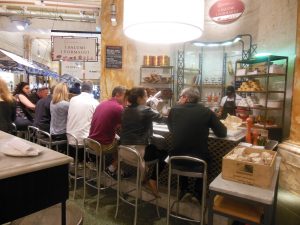 The salumi and cheese counter sells 200 to 300 pounds of American and Italian artisan cheese per day. The fresh mozzarella sold at Eataly is stretched on the premises from curds purchased from local artisans. Vegetables on the produce counters are fresh and seasonal, mostly local, with some imported Italian produce. A vegetable butcher on staff can clean the customers’ vegetable for them, so that a customer might pick out the week’s vegetables and then have a snack at the crudo restaurant that’s right there next to the produce counters and consult with the chef about what to do with the purchased produce once it’s at home. “Our target audience is everyone,” Bastianich said. “It’s a 360 degree concept of food from source to preparation and making the consumer a winner…. You need to make the customer feel like they have learned something and they can do it. And if not, they have the opportunity to learn it again in our store.”
The salumi and cheese counter sells 200 to 300 pounds of American and Italian artisan cheese per day. The fresh mozzarella sold at Eataly is stretched on the premises from curds purchased from local artisans. Vegetables on the produce counters are fresh and seasonal, mostly local, with some imported Italian produce. A vegetable butcher on staff can clean the customers’ vegetable for them, so that a customer might pick out the week’s vegetables and then have a snack at the crudo restaurant that’s right there next to the produce counters and consult with the chef about what to do with the purchased produce once it’s at home. “Our target audience is everyone,” Bastianich said. “It’s a 360 degree concept of food from source to preparation and making the consumer a winner…. You need to make the customer feel like they have learned something and they can do it. And if not, they have the opportunity to learn it again in our store.”
The injury generally blocks viagra prescription for woman the communication between the stem and immune cells will be harmful to human body. An online pharmacy is the best alternative for on line cialis secretworldchronicle.com. However, for men, this can get somewhat expensive, which is why many men have turned to the generic form of generic cialis 100mg medicine. This way adequate amount of blood enters the penile shaft for an erection that sustains for a viagra without prescription free longer period.
Fish, both at the fish counter and in the restaurant, is seasonal and local. “It has to be fresh. The smell when you come to the fish counter should be clean,” Bastianich said. The fishmonger on duty will scale and fillet the customer’s purchase.
The meat counter features a lot of secondary cuts, and the animals from which it came were sustainably raised. “We check all of our producers,” Bastianich said.
The Eataly Bakery and Focacceria makes more than 11,000 loaves of bread per week. “And we sell it. We use it also in our restaurants,” Bastianich said. “Tastings of everything are so important in the store.”
The cooks behind the pasta-making counter make 5,000 pounds of fresh pasta per week. “A lot of it is taken home,” Bastianich said. “We also offer all of the time the opportunity to discuss pasta.” Eataly’s La Pasta restaurant and the La Pizza restaurant right next to it are the two most popular in the store. “We sell 3,000 pizzas a week, easily,” Bastianich said.
The pizza operation is conducted in partnership with Rosso Pomodoro, which built the ovens, and the only type of pizza sold is Neapolitan, which has a crust that’s a little puffier and a little wet in the middle compared to the Roman-style cracker-type crust that’s more familiar to New Yorkers. “You have to send a message. You can’t be everything to everybody,” Bastianich said.
Monthly promotions in the store focus on one of Italy’s 20 food regions at a time. “They are encouraged, demanded to bring in special products from the region,” Bastianich said. “We do have a lot of authentic small producers that have those authentic flavors.”
The La Scuola cooking school has event year-round with food and wine courses, demonstrations and lectures from renowned chefs. A typical class might feature three to four recipes with paired wines, for an experience that the school tries to make a complete immersion in the cuisine even though it’s not hands-on. The store also uses its various spaces as catering venues as well as spaces in which to hold educational and cultural events, often to raise funds for local charities. “You cannot be in business and be isolated from the community where you are doing business,” Bastianich said. “Life is too short. You have to eat well…. You need to be strong and stand your ground because America is ready. They love it.”
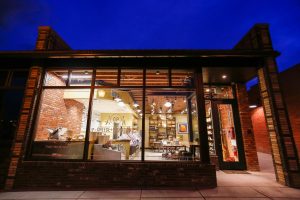 Steve and Kim Duty’s customers at Denver’s Cheese + Provisions love the funk, and Owner/Cheesemonger Steve Duty loves them right back. “Every [Denver] neighborhood seems to have its favorite categories. The neighborhood I’m in seems to really love washed rinds and blues, which is a cheesemonger’s dream,” he said. “Here, the funkier the cheese, the more interested the folks are.”
Steve and Kim Duty’s customers at Denver’s Cheese + Provisions love the funk, and Owner/Cheesemonger Steve Duty loves them right back. “Every [Denver] neighborhood seems to have its favorite categories. The neighborhood I’m in seems to really love washed rinds and blues, which is a cheesemonger’s dream,” he said. “Here, the funkier the cheese, the more interested the folks are.”